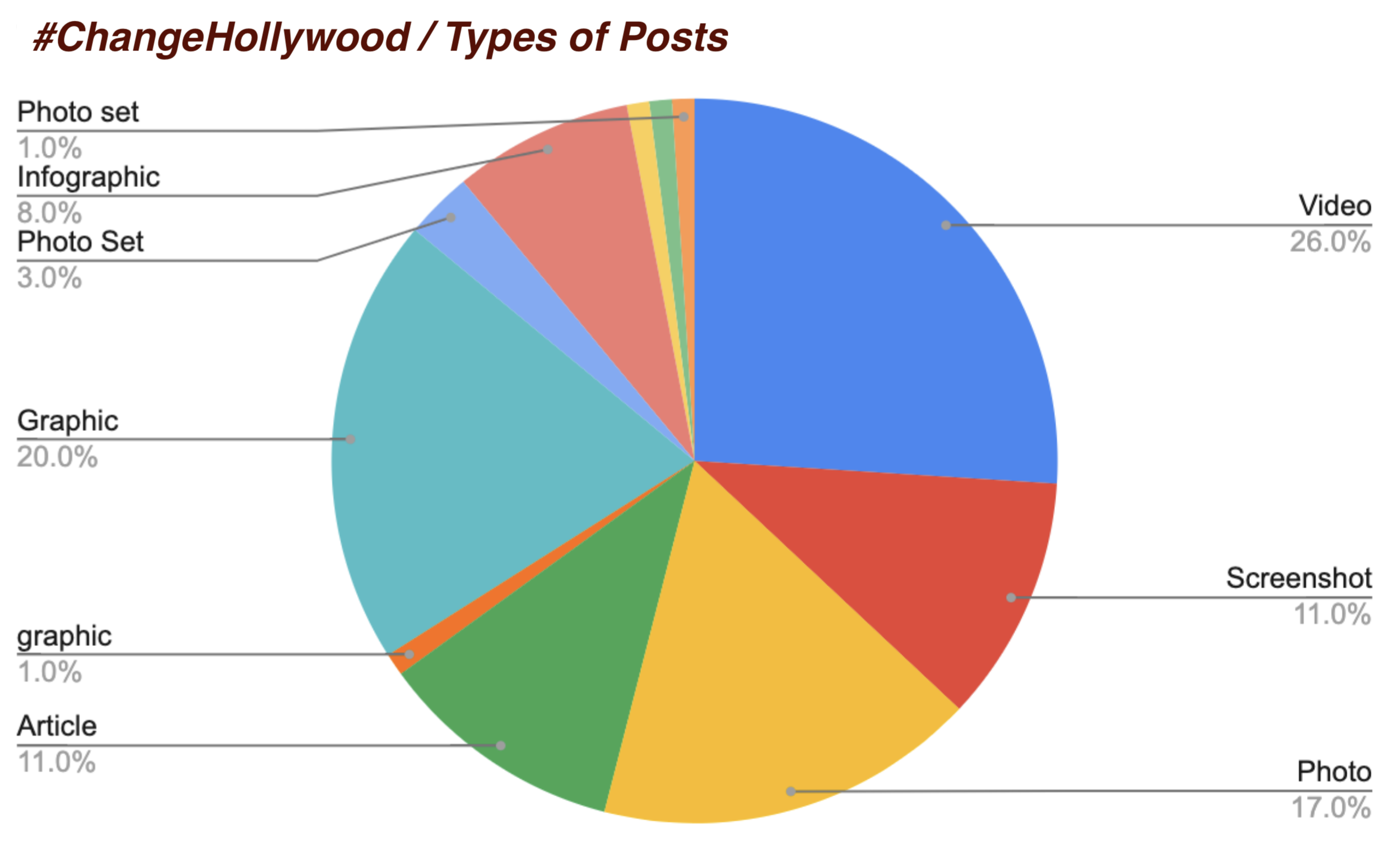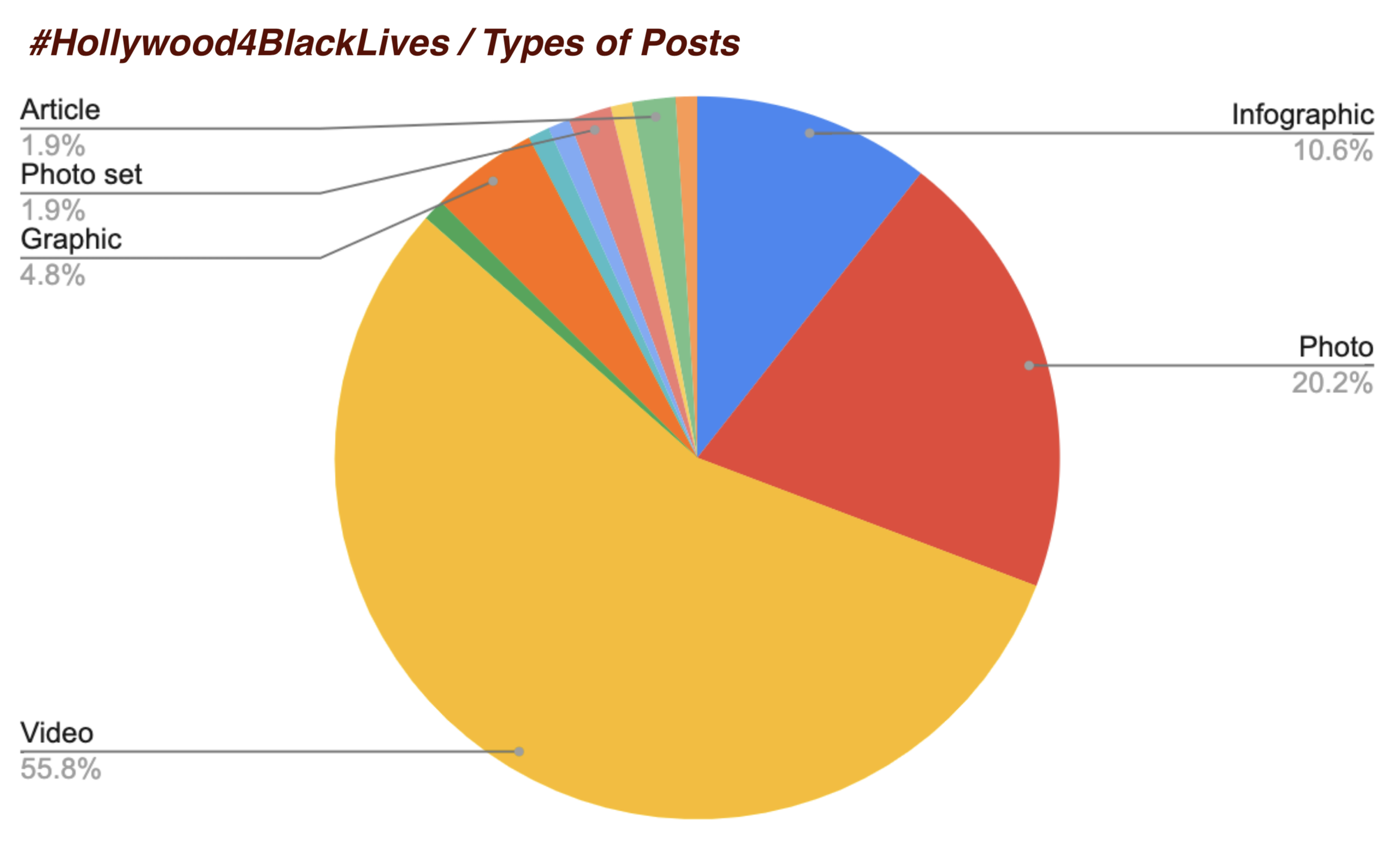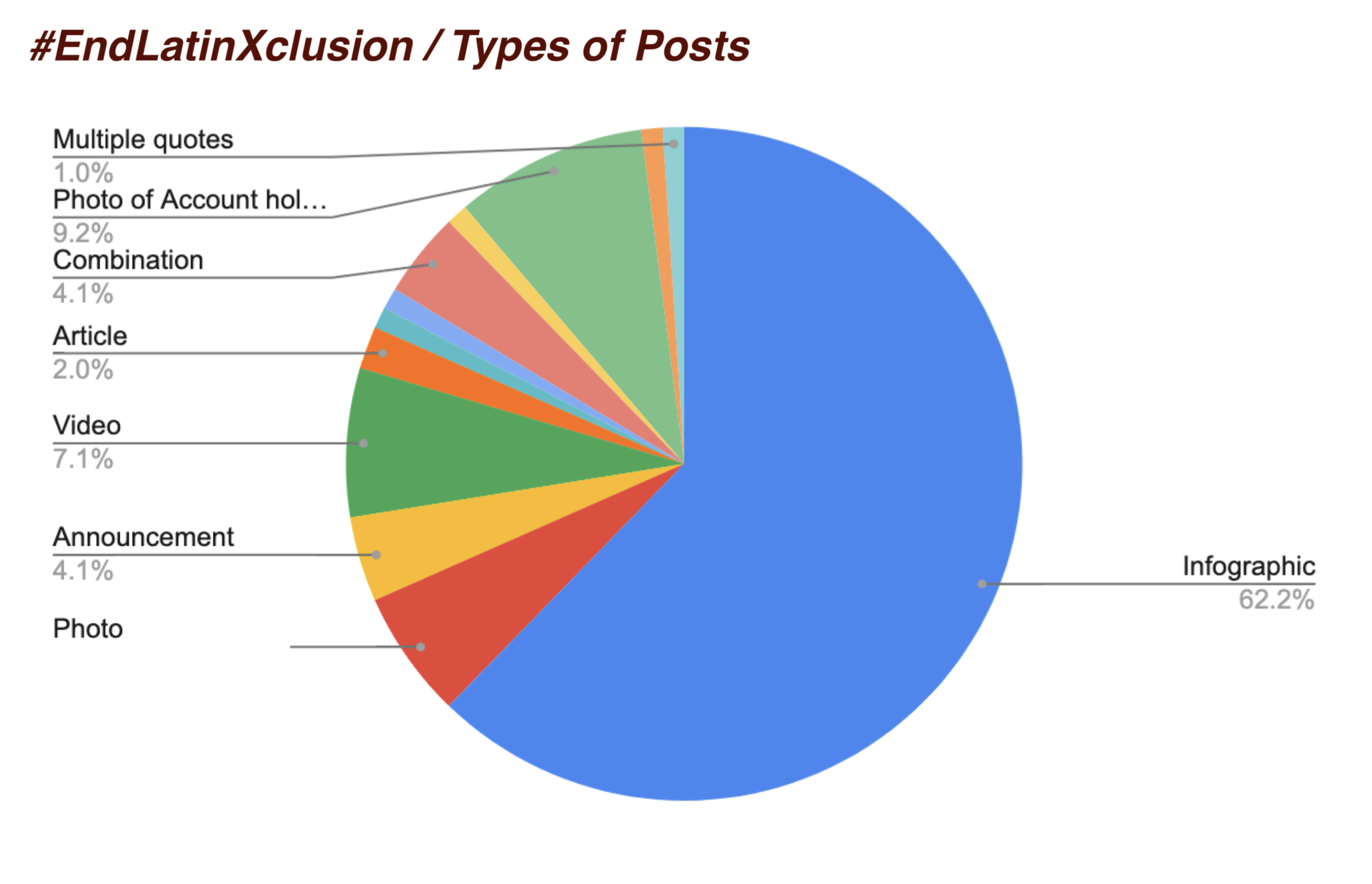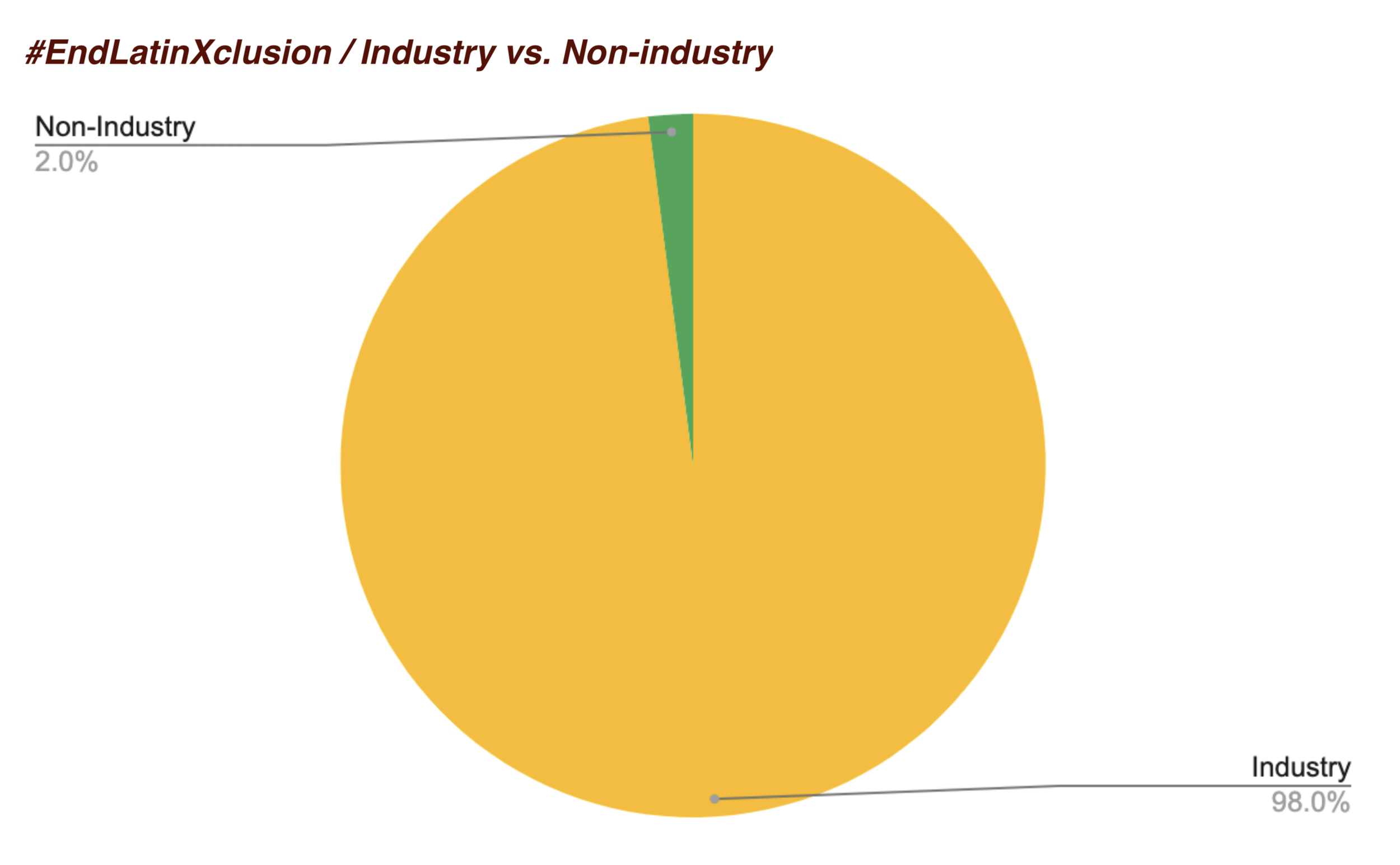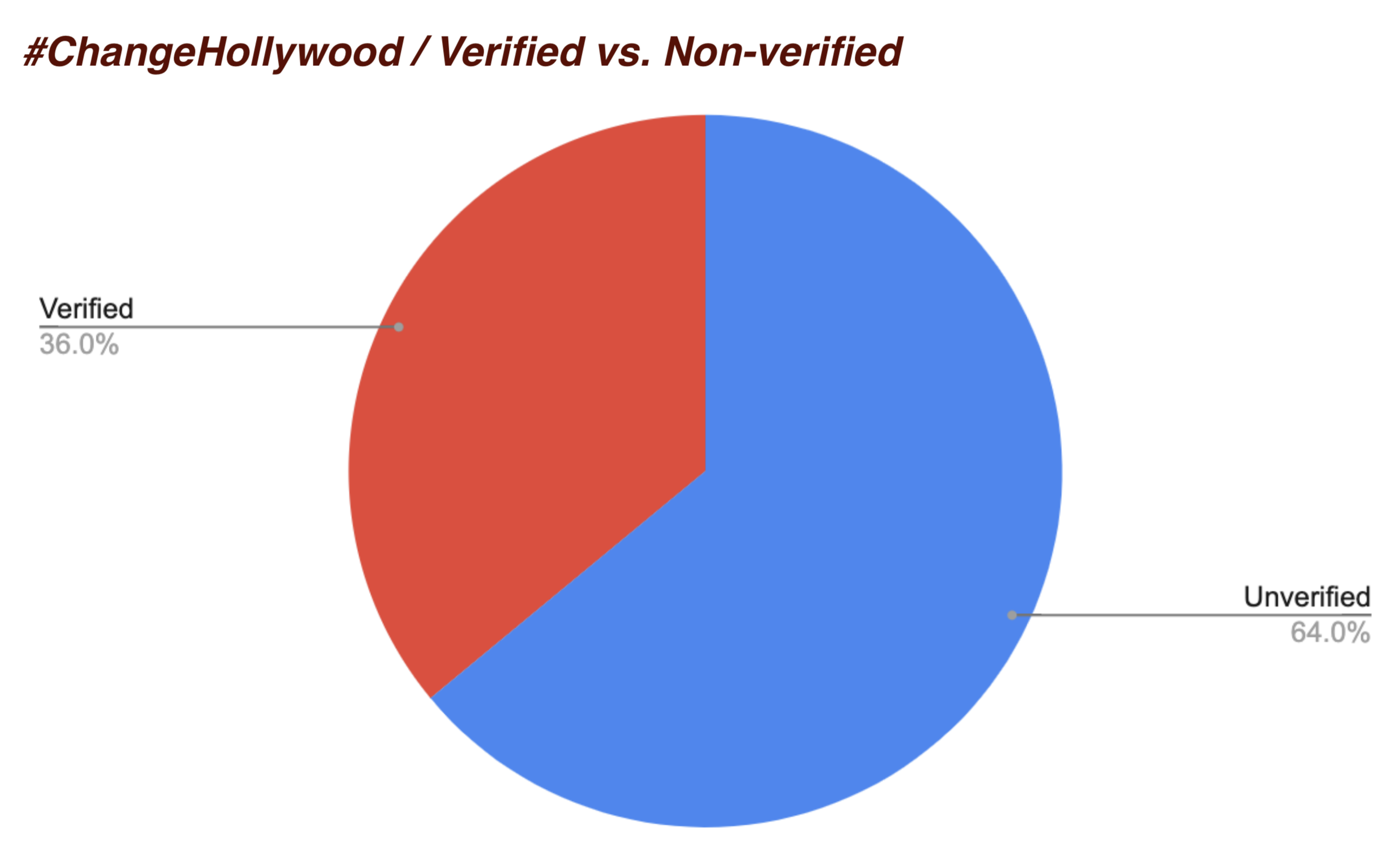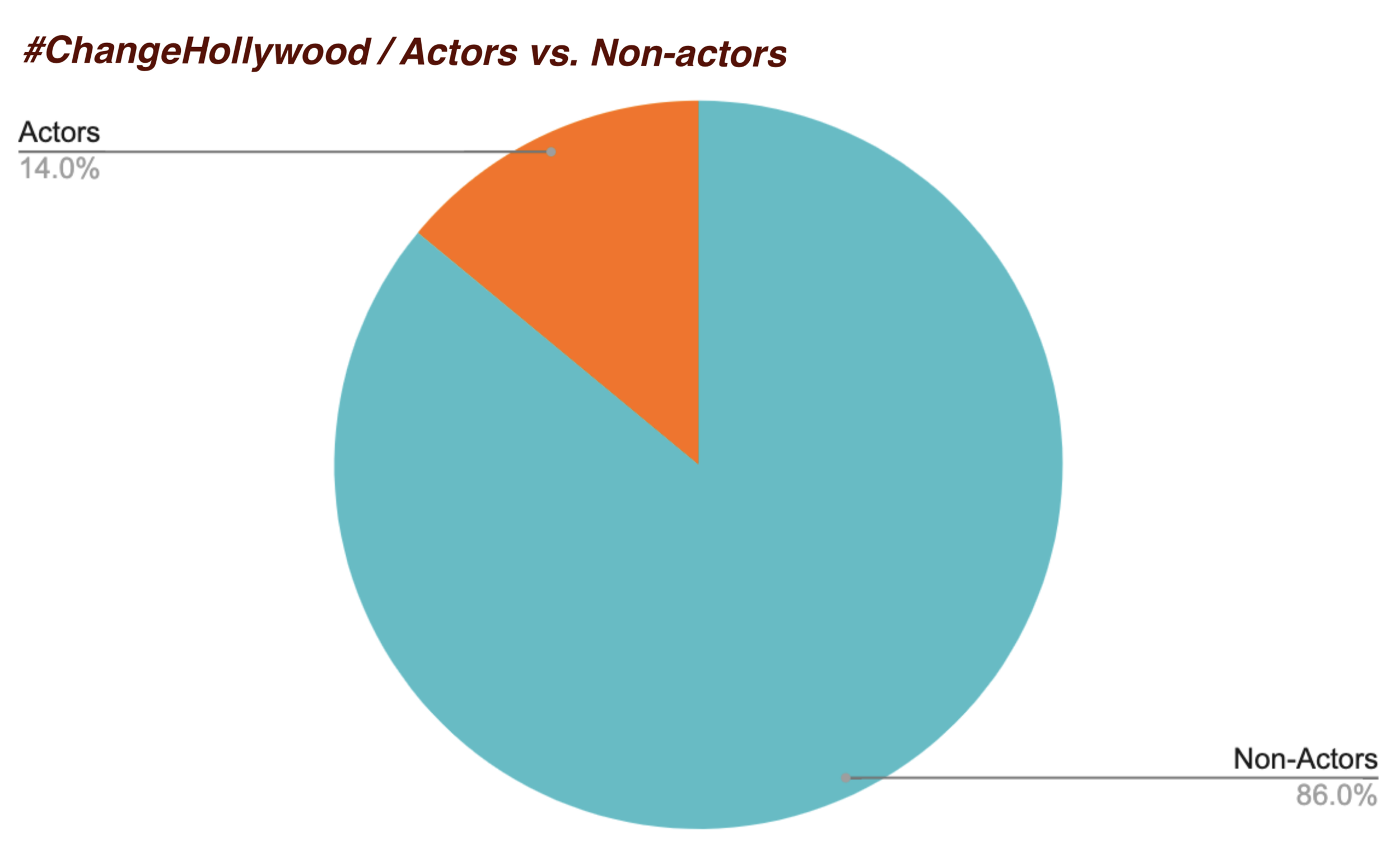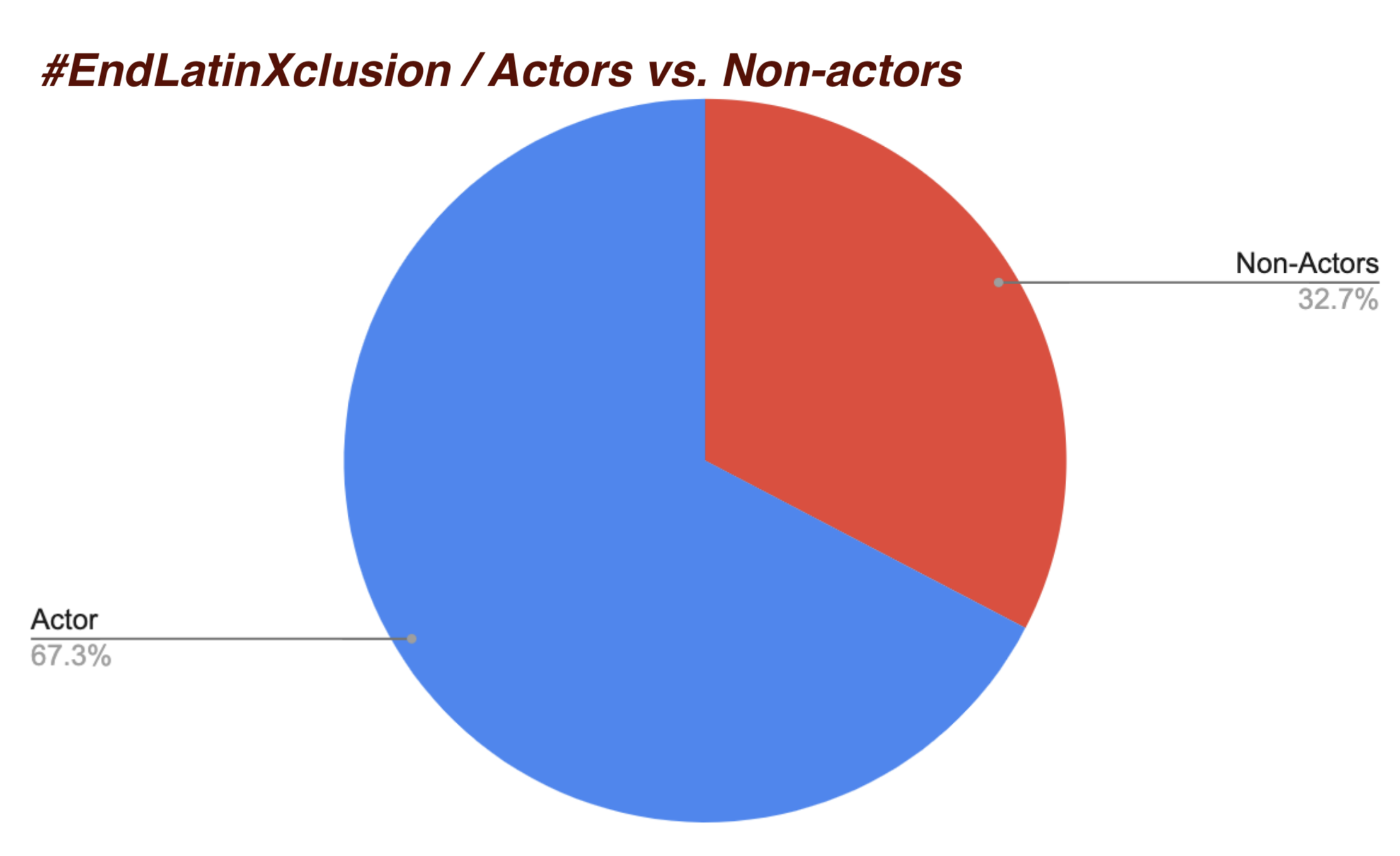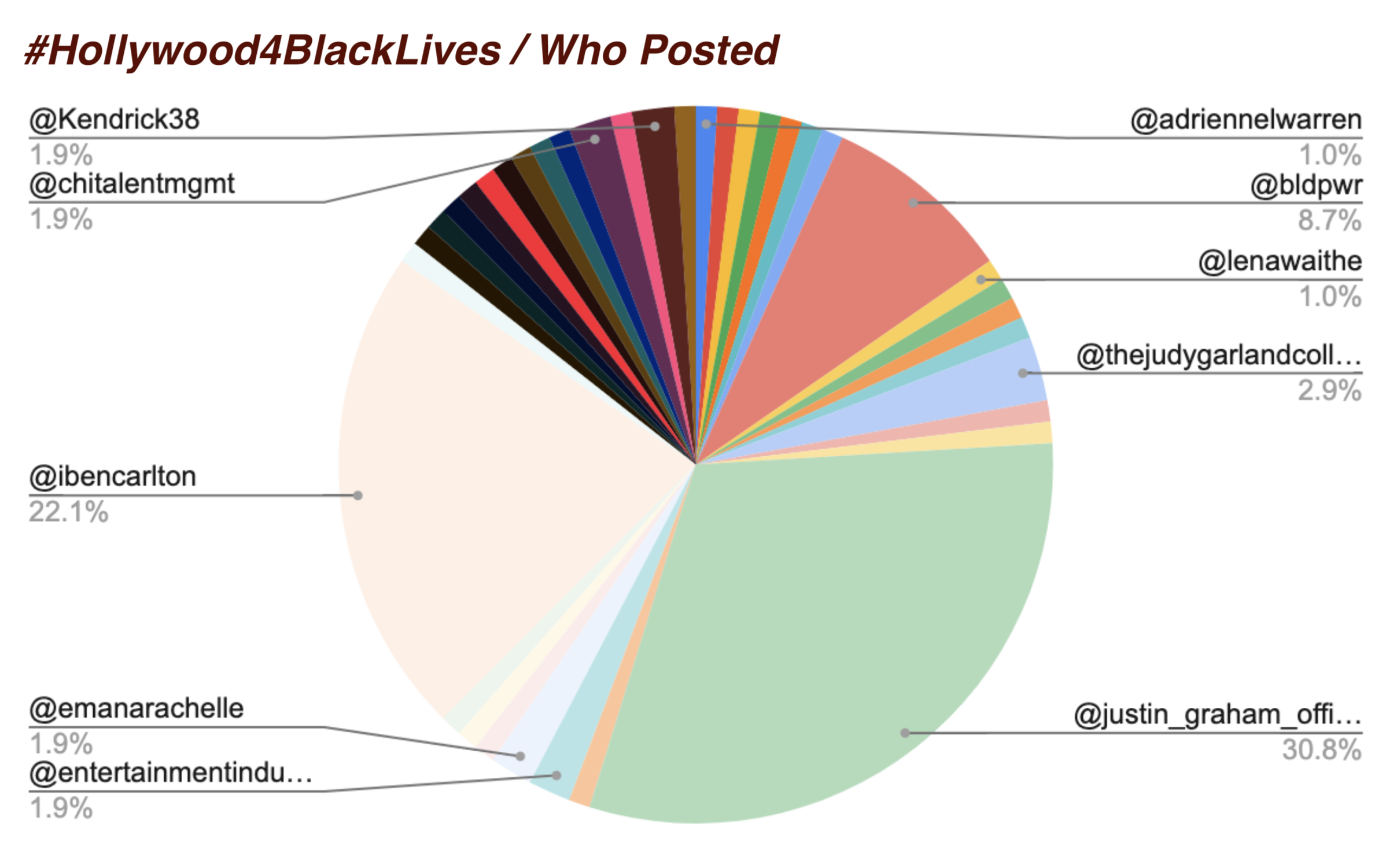
#HashtagActivism in Hollywood
An analysis of solidarity campaigns launched after the 2020 #BlackLivesMatter protests:
#EndLatinXClusion #Hollywood4BlackLives #ChangeHollywood
The summer of 2020 saw the deaths of George Floyd, Breanna Taylor, Tony McDade and so many other Black people trying to survive the police, racism, sexism, transphobia and other harmful systems. Emboldened by the largest global social movement in world history, Hollywood’s Black and Brown writers saw an opportunity to ensure that recent gains in equitable representation would not be erased like in earlier periods of regulatory and technological change the film and TV history, e.g. the rise and fall of blaxploitation in the 1970s or black sitcoms in the 1990s.
The rising power of the Streaming Studio System is sowing fear above-the-line, in addition to below-the-line workers.
Writers, directors and actors already in the system have reaped benefits. Those with hits under their belts – e.g. Shonda Rhimes, Ryan Murphy, Reese Witherspoon, Oprah Winfrey – have secured massive, multimillion dollar development deals with studios and their distributors looking to secure high-value stories in a competitive landscape.
Every day talent face a more complex picture. The push to fill streaming libraries with programming increased opportunities, especially for writers of color and women whose representation had barely increased at all in the previous decade. But these opportunities often paid less, as episode orders decreased and budgets for “small, niche” shows failed to keep pace with pricier prestige or genre-based dramas with top talent. Writers and actors have more jobs, but the residuals marketplace offering payments for re-airings of their performances – once bountiful in the late 20th century’s diverse, global distribution system – are drying up as streamers owned the shows on the channels and kept them there to retain subscribers. Meanwhile, their agency representatives’ power have also increased dramatically as streamers bought “packages” of shows (scripts or ideas with above-the-line already attached) in order to meet consumer demand.
The summer of 2020 saw the deaths of George Floyd, Breanna Taylor, Tony McDade and so many other Black people trying to survive the police, racism, sexism, transphobia and other harmful systems. Emboldened by the largest global social movement in world history, Hollywood’s Black and Brown writers saw an opportunity to ensure that recent gains in equitable representation would not be erased like in earlier periods of regulatory and technological change the film and TV history, e.g. the rise and fall of blaxploitation in the 1970s or black sitcoms in the 1990s.[i] Over 270 Latinx writers and talent launched a campaign to #EndLatinXClusion with an open letter to Hollywood:
Inspired by the activism of the Black and Indigenous communities, many of whom also identify as Latinx, we stand in solidarity with out fellow Blac, Native and Indigenous writers, co-signing their WGAW Open Letters and echoing their demands for systemic change in our industry…[W]e are incensed by the continued lack of Latinx representation in our industry, especially among the Black and Indigenous members of our community. Our stories are important, and our erasure onscreen contributes to the persistent prejudice that prevents real change in this country.
The letter connects cultural solidarity struggles with media representation, which for the Latinx population has long been fraught in U.S. film and television.[ii] They express anger over stereotypes in stories, the over-representation of trauma, the lack of professional mobility (“Latinx writers being asked to repeat Staff Writers and lower level positions”) and, first and foremost, the greenlighting of projects about Latinx people without Latinx producers attached: “we refuse to be filtered through a White perspective.”
We coded all #EndLatinXClusion posts that received more than 100 likes, or 98 of 336 posts, of which 20 posts used part or all of @UntitledLatinxProject’s original caption. The most popular accompanying hashtag was #nostoriesaboutuswithoutus. The thematic codes formulated were as follows, including the top four – Support for message (74), Desire for change (34), Promotion (32), and Hashtag used to increase visibility (13) – along with Highlighting Latinx Talent/Achievements in Hollywood, Social Justice, Personal narrative, and Indictment of Industry. The hashtag largely started discussion within the industry; 96 of the posts were from people who self identified as being in the industry or media brands and companies. It did not sustain a long term social media movement or sizable engagement outside of Hollywood or the entertainment industry as a whole, as usage in 2022 is dominated by self-promotion.
Black writers also organized in the wake of 2020’s protests, making similar demands. The #EndLatinXClusion letters mentions their support for a June 2020 letter from WGA’s Committee of Black Writers, which stated in part:
We Black writers who have ‘made it’ in Hollywood have still been denied jobs at all levels, passed over for opportunities we were qualified for, rejected from writers’ rooms because of a ‘lack of experience,’ unsupported when seeking to create content specifically for Black audiences, critically underpaid and mistreated compared to white counterparts, and historically ignored during awards season.[iii]
Their concerns echoed many of the other concerns of workers above and the below the line. It was just the beginning of Black above-the-line workers claims for justice, often in solidarity with below-the-line workers.
Later in summer 2020 Kendrick Sampson’s activist organization BLD PWR organized #Hollywood4BlackLives (#H4BL), recruiting everyone from the late Chadwick Boseman to Oprah Winfrey alongside activists and executives to sign and promote their message that: “Due to Hollywood’s immense influence over politics and culture, all of the racism, discrimination and glass ceiling Black people in Hollywood experience on a regular basis have direct implications on Black lives everywhere.” The campaign had five demands: 1) To divest from police, 2) Divest in anti-Black content, 3) To invest in anti-racist content, 4) Invest in more Black people’s careers, and 5) Invest more in the Black community as a whole — by hiring more Black individuals and supporting Black-owned businesses for example everywhere.[iv] Here we can see how the campaign connects the concerns of all Black people on set, regardless of rank (via the divesting of police and investing in careers) to the politics of representation (investing in anti-racist stories over anti-Black ones) and finally the Black community in general. BLD PWR’s social media presence consistently builds on this message. Its Instagram page shares information on a range of topics including: campaigns local to Los Angeles, where Sampson lives, and Houston, where he’s from; global struggles for justice from Colombia to Palestine; solidarity with aligned communities, including trans/nonbinary, Asian and indigenous peoples; while also pushing the industry, e.g. sharing an article on the billions studios do not make by not developing diverse stories.
While BLD PWR and EndLatinXclusion pursued a grassroots strategy by getting fans of star writers and actors to retweet and repost their messages by the thousands, Rashad Robinson’s advocacy group Color of Change combines a grassroots strategy with an insider strategy. Its #ChangeHollywood campaign blossomed into a broader #ChangeIndustries initiative, including #ChangeFashion and #ChangeMusic. Color of Change’s strategy is to “secure commitments from cultural production companies to hold them accountable for advancing racial justice for Black people.” It identifies five “universal” steps to justice including: “1) invest in Black talent and careers, 2) commit to transparent reporting, 3) invest in content that advances racial justice, 4) invest in Black safety, 5) invest in the growth and prosperity of Black communities.” It is clear the goals of #ChangeIndustries aligns with those of BLD PWR and EndLatinXClusion, with the critical difference of its focus on working within industries to secure data and leverage contracts as tools for accountability.
Far from grassroots activism, Color of Change’s biggest innovation is arguably its “Inclusion Rider,” a clause that high-value talent can add to their contracts to ensure the production companies and studios are tracking and working to improve representation behind the camera. Color of Change has at least a dozen studios using the rider as of this writing, with the most important partner being WME, the mega-agency with outsize influence in television and the last holdout in the WGA’s packaging negotiations (its studio arm, Endeavor, was the largest agency-aligned studio, so big it spun off into its own publicly traded company). With incredibly popular and powerful clients across film, television, fashion, music, sports and social media, WME’s support allowed Color of Change to expand into fashion and music. Though it launched as a hashtag, the Change Hollywood campaign’s goal is integration into the new studio system, understanding that without participation from the few major conglomerates, changing the system is impossible. In a panel at the 2022 Sundance Film Festival, Robinson said the campaign’s goal was “to enable the people at these companies who are the champions to be able to do their best work.” WME senior vice president of social impact Romola Ratnam agreed, stated that WME got involved because “it was very important to one of our clients” – as reports suggest WME clients Michael B. Jordan, Matt Damon & Ben Affleck, Paul Feig and Brie Larson were all early to commit.[v] Ratnam said having independent partners like Color of Change “keep[s] you honest.” Changing the industry from the inside requires grassroots participation, however, as Ratnam stated: “The pressure needs to continue to ensure that institutions like ours are accountable.”
What change can be achieved remains to be seen, but holding the Streaming Studio System accountable will require organic collaboration between above- and below-the-line workers and between workers and film/TV consumers. All these efforts are new and emerging amid increasing consolidation of corporate power. Whether unions like IATSE and WGA, who have publicly stated the importance of race and gender equity in contract negotiations, will join in the moment to build equitable labor practices into the industry’s culture is an open question. But they have some wins, particularly the inclusion of diversity initiatives within the latest IATSE contract.[vi] Whether consumers care enough about how their media is made to apply the necessary outside pressure to ensure accountability, however, has little historical precedent.
[i] Kara Keeling, The Witch's Flight: The Cinematic, the Black Femme, and the Image of Common Sense (Durham, NC: Duke University Press, 2007); Brennan Williams and Gazelle Emami, “How To Make It As A Black Sitcom: Be Careful How You Talk About Race,” Huffington Post (December 6, 2017): https://www.huffpost.com/entry/black-sitcom-black-ish_n_6002850
[ii] Mary Beltrán, “Latina/os on TV!: A proud (and ongoing) struggle over representation and authorship,” The Routledge companion to Latina/o popular culture (New York, NY: Routledge, 2016): 39-49; Frances Negrón-Muntaner, et al, “The Latino Media Gap: A Report on the State of Latinos in U.S. Media,” Media Alliance (May 2016): http://www.media-alliance.org/wp-content/uploads/2016/05/Latino_Media_Gap_Report.pdf; Stacy L. Smith, Katherine Pieper, Marc Choueiti, Kevin Yao, Ariana Case, Karla Hernandez & Zoe Moore, “Inclusion in Netflix Original U.S. Scripted Series & Films,” USC Annenberg Inclusion Initiative (February 2021): https://assets.uscannenberg.org/docs/aii-inclusion-netflix-study.pdf
[iii] Anousha Sakoui, “Black writers call for accountability, revamped hiring in open letter to Hollywood,” Los Angeles Times, June 12, 2020, https://www.latimes.com/entertainment-arts/business/story/2020-06-12/black-writers-wga-film-tv-open-letter-to-hollywood
[iv] BLD PWR, Hollywood4BlackLives: Prove Black Lives Matter to Hollywood. https://bldpwr.com/hollywood-4-black-lives/
[v] Rebecca Sun, “Ari Emanuel: “It is Imperative” That WME Supports Inclusion Rider (Exclusive),” The Hollywood Reporter (March 14, 2018): https://www.hollywoodreporter.com/news/general-news/ari-emanuel-it-is-imperative-wme-supports-inclusion-rider-1094349/
[vi] IATSE reported “adoption of diversity, equity and inclusion” initiatives as a win in their negotiations: IATSE, “Landmark tentative agreement reached for IATSE West Coast Film and Television Workers before Strike Deadline,” IATSE News Releases (October 16, 2021): https://iatse.net/landmark-tentative-agreement-reached-for-iatse-west-coast-film-and-television-workers-before-strike-deadline The WGA included diversity in their negotiations with the studios via the Alliance of Motion Picture & Television Producers and with the agencies via the Association of Talent Agents, even before the Black Lives Matter protests. See: David McNary, “WGA Leaders Demand Studios Deliver More Data on Diversity and Inclusion,” Variety (May 29, 2020): https://variety.com/2020/film/news/wga-leaders-studios-improve-diversity-inclusion-1234620588; David Robb, “WGA And ATA To Resume Talks Thursday After Agents Offer Deal – Update,” Deadline (March 12, 2019): https://deadline.com/2019/03/talent-agents-wga-talksata-offers-transparancy-and-disclosure-but-wont-give-up-packaging-and-production-ties-1202574691
COMPLETE ANALYSIS
By Sheyda Tribble, Northwestern University
#EndLatinXclusion
#EndLatinXclusion was part of a call to action created by the @UntitledLatinxProject whose mission is to “increase Latinx representation in television, broadcast, cable, and streaming platforms through content created by Latinx writers.” They originated the hashtag and #DearHollywood infographic. The #DearHollywood infographic is a 9 photo post of their five demands to Hollywood “No stories about us without us, Greenlight our projects, Represent All Aspects of Our Lives and Culture, Do Away with Repeating Levels, Hire Us for Non-Latinx Projects.” The post also contains. 270+ signatures of Latinx talent. All of the posts included in this analysis had over 100 engagements in the form of likes or views. Of 336 posts using the hashtag 98 fit the criteria. Reposts of the #DearHollywood graphic represents 59 of the 98 posts. 20 posts used part or all of @UntitledLatinxProject’s original caption. The most popular accompanying hashtag was #nostoriesaboutuswithoutus. The thematic codes formulated were as follows: Desire for change, Promotion, Highlighting Latinx Talent/Achievements in Hollywood, Hashtag used to increase visibility, Support for message, Social Justice, Personal narrative, and Indictment of Industry. The top four themes were Support for message (74), Desire for change (34), Promotion (32), and Hashtag used to increase visibility (13).
The posts are concentrated around the dates of 10/15/2020 (55 posts) and 10/16/2020 (13 posts) when the original post was shared. Latina actress @alejandracorman used the hashtag 11 times in posts largely unrelated to the movement to promote herself and her work. She has been the only user of the hashtag in 2022 and made the most recent uses of the hashtag. 96 of the posts were from people who self identified as being in the industry or media brands and companies. The only person with over 100 engagements who was not in the industry was @bookishboshemian, a social justice book influencer, who used the hashtag along with several other social justice related hashtags in 2 posts.
Additional Post stats:
- 18 verified accounts
- 31 actors/actresses
- 39 Above the line
- 24 Media Companies or organization
- 5 Other Industry
- 2 Non Industry
It is apparent that use of this hashtag was almost entirely industry dominated and did not sustain a long term social media movement or sizable engagement outside of Hollywood or the entertainment industry as a whole.
#Hollywood4BlackLives
#Hollywood4BlackLives was a hashtag created by Kendrick Sampson’s @bldpwr activist organization. The original hashtag included an infographic with a list of demands for Hollywood to end discriminatory practices and value Black lives. The hashtag has been used on 671 different posts. 104 of the posts with over 100 likes or engagements were selected for analysis. The top 4 thematic codes on the posts were, Support for message (30), Promotion/Branding (65), Hashtag used to increase visibility (74), Social Justice (29). Kendrick Sampson was featured in 9 posts. The hashtag was used 8 times in posts tributing the late actor Chadwick Boseman. Promotion/Branding was seen in outlets who used the hashtag to report on the movement, the accounts themselves, or individuals who were seeking to amplify their account and align themselves to social justice themes. Many posts were accompanied by this hashtag and several others in order to increase visibility for the post or account holder for content that was not directly related to the injustices outlined by the #Hollywood4BlackLives movement. Some users connected #Hollywood4BlackLives to broader social justice issues such as voting or police brutality.
Notably, 32 of the posts came from a self identified amateur actor @justin_graham_official. His use of the hashtag seemed largely to be about promoting himself or signaling his general support and affinity for Black culture. 23 posts came from @ibencarlton, another actor, who identifies as an activist as well.
Additional post stats:
- 24 verified account holders
- 73 posts from actors/actresses
- 1 post from someone above the line
- 21 posts from media companies or organizations
- 3 posts from people in other parts of the industry
- 9 posts from accounts outside of the industry
#Hollywood4BlackLives has maintained more engagement long term than #EndLatinxclusion, but that engagement is primarily driven by movement leaders such as Kendrick Sampson and @bldpwr. Additionally the hashtag is used for individuals to promote their content and brand themselves as affiliated with social justice movements. #Hollywood4Blacklives had the most non-industry participation.
#ChangeHollywood
Color of Change created the #ChangeHollywood hashtag alongside Michael B. Jordan. The original post accompanied a graphic, a roadmap to change and 4 demands to Hollywood: Divest from Police, Invest in Anti-Racist Content, Invest in Black Talent and Careers and Invest in Black Communities. The hashtag contains 525 posts. For the sake of analysis, 100 posts with over 100 engagements were sampled for analysis. 14 posts came from the @colorofchange account, while 4 came from the @bldpwr account. The top 4 thematic codes used to describe the qualities of the posts were as follows: Promotion/Branding (62), Support for message (39), Desire for change (19), and Hashtag used to increase visibility (44). 27 of the posts were detailed Michael B. Jordan’s involvement with the movement. 58 posts come from media companies or media organizations. Many of these outlets reported on the #ChangeHollywood initiative and Michael B. Jordan’s involvement. Many of the Promotion/Branding posts came from entertainment news instagram accounts or other media organizations. Posts where the hashtag was used to increase visibility often used many different hashtags either in the caption or comments. Desire for change was used in posts that detailed more emphatic interest in the movement than posts that simply demonstrated support for #ChangeHollywood’s central message.
Additional Post Stats:
- 36 posts from verified accounts
- 14 posts from Actors/Actresses
- 6 posts from Above the Line talent
- 14 posts came from individuals in other parts of the industry
- 8 posts came from accounts outside of the entertainment industry
#ChangeHollywood featured more above the line engagement than #Hollywood4BlackLives. Like #Hollywood4BlackLives much of the use of the hashtag came from stakeholders within the original accounts and posts. Additionally, the hashtag was used for promotion/branding particularly by Color of Change in various projects and partnerships like the release of their short documentary film.
#ChangeHollywood and #Hollywood4BlackLives are the most similar hashtags. They are often used on posts in tandem and clearly @bldpwr and @colorofchange have a demonstrated relationship and similar common goal. They have sustained more momentum than #EndLatinxClusion in part because of the hashtag originators continued usage and elevation of the tag as a way to promote and brand their accounts and respective movements.
VISUALIZATIONS
NOTE: GRAPHS NOT COLOR-CODED CONSISTENTLY

